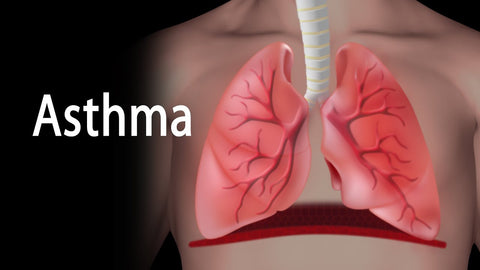
Ayurveda and Asthma
Share
Asthma is a chronic respiratory disease that affects the airways and makes it difficult to breathe. According to Ayurveda, asthma is caused by an imbalance in the doshas, which are energies that govern different functions of the body. Ayurvedic treatments for asthma focus on restoring balance to the doshas and reducing inflammation in the airways.

Dietary Changes
One of the key aspects of Ayurvedic treatment for asthma is dietary changes. Ayurveda places a strong emphasis on diet and nutrition and recognizes the importance of eating a balanced diet to maintain good health. People with asthma may be advised to avoid foods that can trigger their symptoms, such as dairy products, cold foods and drinks, and fried or processed foods. Instead, they may be encouraged to eat warm, cooked foods that are easy to digest and high in fiber and nutrients.
Ayurveda also recommends the use of specific herbs and spices in the diet to help manage asthma symptoms. For example, turmeric, ginger, and black pepper are believed to have anti-inflammatory properties that can help reduce inflammation in the airways. Ayurvedic practitioners may also recommend the use of herbal remedies, such as licorice root or holy basil, to help manage asthma symptoms.
Breathing Exercises
Another important aspect of Ayurvedic treatment for asthma is breathing exercises. Ayurveda recognizes that the breath is a powerful tool for healing and offers a range of breathing exercises, or pranayama, to help manage asthma symptoms. Pranayama exercises can help improve lung function, increase oxygen flow to the body, and reduce stress and anxiety, which can exacerbate asthma symptoms.
Some common pranayama exercises for asthma include deep breathing, alternate nostril breathing, and ujjayi breathing. These exercises can be done at home or under the guidance of a qualified Ayurvedic practitioner.
Yoga
Yoga is a gentle form of exercise that can be beneficial for people with asthma. It can help improve lung function, reduce stress, and promote relaxation, all of which can help manage asthma symptoms. Some yoga poses that may be beneficial for people with asthma include the cobra pose, the fish pose, and the bridge pose.
However, it is important to note that not all yoga poses are appropriate for people with asthma. Certain poses, such as the wheel pose or the camel pose, may put too much strain on the lungs and should be avoided. It is important to practice yoga under the guidance of a qualified instructor who is knowledgeable about asthma and can modify poses as needed.
Herbal Remedies
Ayurvedic practitioners may also recommend the use of herbal remedies to help manage asthma symptoms. Some commonly used herbs for asthma include turmeric, ginger, licorice root, and holy basil. These herbs are believed to have anti-inflammatory properties that can help reduce inflammation in the airways.
However, it is important to note that not all herbal remedies are safe or effective for everyone. Some herbs can interact with medications or cause adverse side effects, particularly if they are not used properly. It is important to consult with a qualified Ayurvedic practitioner before using any herbal remedies for asthma.
Panchakarma
Panchakarma is a cleansing therapy used in Ayurveda to remove toxins from the body. It involves a series of treatments, such as massage, herbal steam baths, and enemas, that help to remove accumulated toxins from the body. Panchakarma can be helpful for people with asthma because it helps to reduce inflammation and improve overall health.
However, it is important to note that panchakarma should only be done under the guidance of a qualified Ayurvedic practitioner. Panchakarma can be a powerful therapy and may not be appropriate for everyone, particularly those with certain health conditions or medical concerns.

In conclusion, Ayurveda offers a holistic approach to managing asthma symptoms. By addressing the underlying imbalances in the body, Ayurvedic treatments can help reduce inflammation, improve lung function, and prevent flare-ups. However, it is important to use these treatments in conjunction with conventional treatments and under the guidance of a qualified healthcare provider. With the right combination of treatments and lifestyle changes, people with asthma can lead healthy, active lives.
